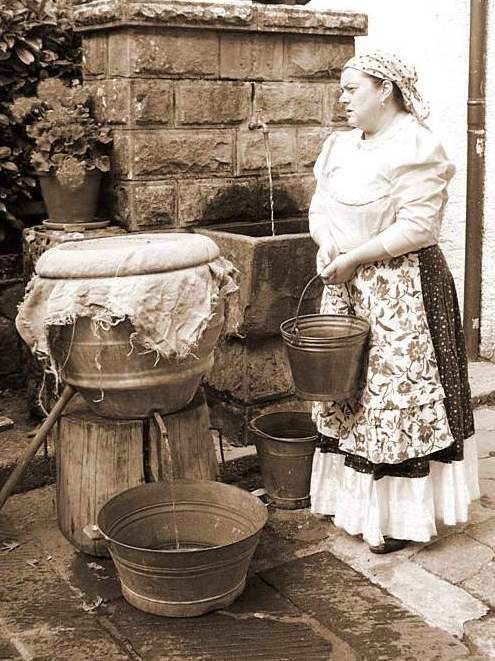When our 78 year old neighbour Dina was a girl, la gente andava giù al fiume a fare il bucato (people went down to the river to do their washing). The freshly washed clothes were left stretched out on big rocks to dry in the sun. Dina remembers that ‘i panni lavati così erano tutta un’altra cosa’ (clothes washed in this way were really something else), and believes that the modern washing machine – la lavatrice – can’t wash clothes as well as the old method.
Detersivi (detergents) and ammorbidenti (fabric softeners) didn’t exist in those days, so people made their own soap using left over olio di oliva (olive oil), or grasso di maiale (pig fat) boiled in water with caustic soda, left to cool, and cut into small blocks. This soap was also used for personal hygiene.
Before washing la biancheria (the linen) with soap however, it was first bleached and disinfected in the following way:
A large terracotta container, called la conca, was filled with la biancheria. This was covered with un telo (a cloth) called il cenerone, on which was placed la cenere (ash) from the wood stove. Boiling water was poured over la cenere and allowed to filter through the linen inside la conca, exiting into a container from a spout at the base. This water was reheated and the process repeated until the the water that came out of the conca was the same temperature as that poured in. This indicated that all the linen had been properly soaked (see photo below).

La biancheria was then ready to be taken to the river or il lavatoio (the laundry). Il lavatoio in our village consisted of two large vasche (water troughs) under a stone arch, which were fed by una sorgente (a spring). This old lavatoio, where all the women once gathered to lavare i panni (wash the clothes), and exchange pettegolezzi (gossip), is now part of our property, and we mainly use it to store our supply of wood for the winter.

Above: Dina leads a cow down the street past the arch of the old lavatoio
Dina doesn’t, however, romanticize about the past in the way that many disillusioned city dwellers do. ‘Le cose sono molto meglio adesso poiché nel passato la vita era molto dura’ (things are much better now because in the past life was really hard), says Dina. In fact spending hours bent over the lavatoio washing clothes in the chilly spring water was just one of the hard physical tasks that women had to perform in the so called bei tempi andati (good old days).







Comments:
Gil Lanzarotti:
Your Blog is very interesting, I always look forward to seeing it.
I have witnessed this operation in a small hilltop village near Rieti in the 1954. It was when I visited parenti for the first time. I also saw women ironing clothes with irons that had red hot embers inside and saw meals prepared via fire place. Great experience!
Giacomo Sileo:
Cara Serena,
I would be forever indebted to you if you would please render your opinion on this “conguintivo problema” to help us settle this “ dibattito” for our small Italian class in Denver con Cinzia.
Which examples of these 2 sentences are correct.
I believe you were reading reading this book
Credo che tu abbia letto questo libro
Credo che tu leggessi questo libro
Credo che tu stessi leggendo questo libro
Credo che tu stia leggendo questo libro
Credo che tu sta leggendo questo libro
I thought you were reading this book
Pensavo che tu leggessi questo libro
Pensavo che tu abbia letto questo libro
Pensavo che tu stessi leggendo questo libro
Grazie tantessime!
Cordialmente,
Giacomo Sileo jim@sileo.com
Serena:
@Giacomo Sileo Ciao Giacomo, to make things nice and clear I’ve translated each of your sentences:
Credo che tu abbia letto questo libro – I believe you have read this book
Credo che tu leggessi questo libro – I believe you were reading this book
Credo che tu stessi leggendo questo libro – I believe you were reading this book
Credo che tu stia leggendo questo libro – I believe that you are reading this book
Credo che tu sta leggendo questo libro – this sentence is grammatically incorrect. Tu stai leggendo is more correct but then it doesn’t use the subjunctive … let’s say that you could get away with it if you wanted to say ‘I believe that you are reading this book’!
Pensavo che tu leggessi questo libro – I thought you were reading this book
Pensavo che tu abbia letto questo libro – this sentence is grammatically incorrect.
Pensavo che tu stessi leggendo questo libro -I thought you were reading this book
As you can see, for each example you have two correct choices.
Va bene?
Saluti da Serena